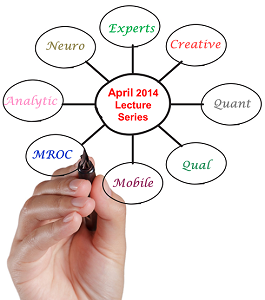April Lecture Series 2014

April 2014 Lecture Series
Listen to leading experts deliver 40-45 minute introductions to key NewMR topics, with plenty of time for Q&A afterwards.
Access the slides and recordings through our Play Again page.
- Questionnaire Design:A Masterclass
Pete Cape from Survey Sampling.
8 April, 2014 – 9:30am EDT (New York), 2:30pm BST (London), 3:30pm CEST (Belgium), 7:00pm (IST) India - Online Community VIPs (Very Important Participants)
Tom De Ruyck, Anouk Willems from InSites Consulting.
24 April, 2014 – 10am EDT (New York), 3pm BST (London), 4pm CEST (Belgium), 7.30pm IST - Suz Allen, from Campbell Arnott’s Asia Pacific.
29 April, 2014 – 8pm EDT (New York) (28th May), 1am BST, 2am CEST, 5.30am IST, 10am AEST (Sydney) - The Power of the Dark Side: Motivation, Positioning and the Seven Deadly Sins
Shobha Prasad, from Drshti Strategic Research Services.
30 April, 2014 – 5.30am EDT, 10.30am BST (London), 11.30pm CEST (Belgium), 3.00pm IST (India), 7.30pm AEST
As well as the April Lecture Series we have the May series, click here to see the May programme.
Descriptions of the Presentations
Questionnaire Design: A Masterclass
Pete Cape, from Survey Sampling.
8 April, 2014
Many inquisitive junior researchers will have quickly found that, on asking the question “why do we do it like that?”, that their mentor, far from being the font of all wisdom, rapidly assumes the manner and tone of exasperated parents the world over and snaps back; “because I said so!”. That they actually say “because that’s the way we do it round here…” is immaterial, the lesson is quickly learnt. In this session we will examine some of the common ways of tackling question types and asks ourselves; which is best? With so many approaches to employ does it really matter which one we take? It does if we set ourselves up as master practitioners in the art of asking questions.
Online Community VIPs (Very Important Participants)
Tom De Ruyck, Anouk Willems, from InSites Consulting.
24 April, 2014
The new buzzword in the research industry is collaboration. In MROCs we consider the participants as equal partners more than other methods. We empower them to start their own discussions and enable them to share (un)solicited feedback. However, the roles are still separate: we are the researchers, they are the participants. For successful collaboration, we need to challenge these traditional, distinct roles and examine the convergence of the roles of a researcher and participant. What would happen if we bring down these walls and turn participants into researchers as our co-moderators? Recent case studies demonstrate that community participants are not only perfectly capable of taking on the role as co-researchers, it’s also a way to close cultural, generation and knowledge gaps. By placing participants in the context of that of co-researcher, we can analyze a research question from multiple perspectives in order to check and establish validity in qualitative research.
Access the slides and recordings for this event through our Play Again page.